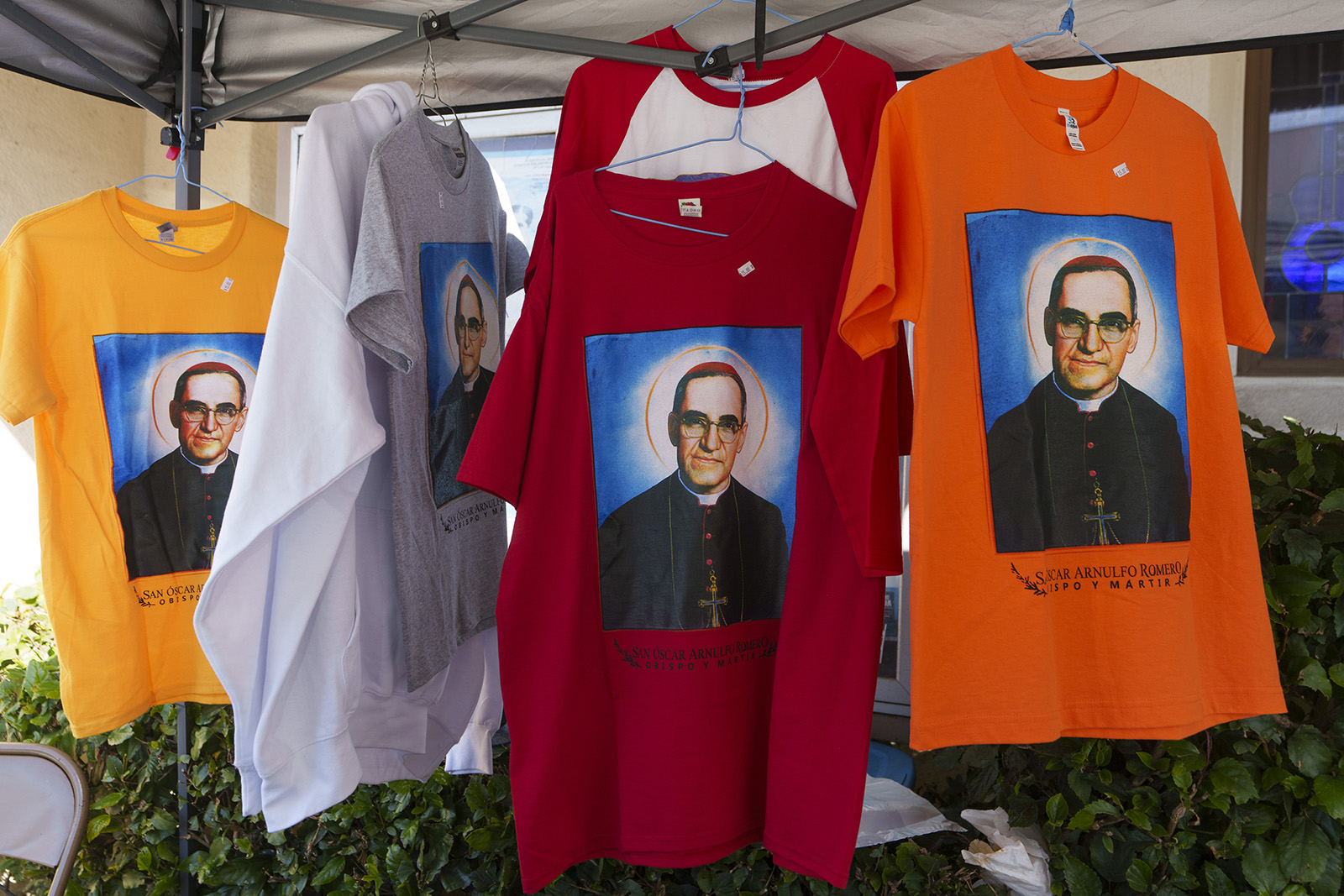
(RNS) — Shortly before checking himself in to Rome’s Gemelli hospital in mid-February, Pope Francis issued an unusual — and unusually blistering — open letter to the American Catholic bishops, calling the Trump administration’s plan to deport millions of immigrants from the U.S. “a major crisis” and urging Catholics to stand for human dignity, having earlier called it “a disgrace.”
As President Donald Trump’s first 100 days in office have been marked by a barrage of anti-immigrant rhetoric, cancellation of refugee programs and detentions of even immigrants with legal status, the U.S. bishops have issued their own letters in protest and sued to reinstate federal funding to resettle immigrants. But after losing the suit on appeal, the U.S. Conference of Catholic Bishops decided in early April to end its decades-long collaboration with the government, while asking for prayers “that we might still find generous ways to respond to crises.”
Some Catholic observers believe the church has been too meek. Michael Lee, director of Fordham University’s Center for American Catholic Studies, said in an interview, “I find it striking that we’ve had a politics that has called itself pro-life for so long that seems to be turning its back on what is clearly the defense of human lives,” said Lee.
The National Catholic Reporter’s Michael Sean Winters, recalling the bishops’ response to the Obamacare contraception insurance mandate, when they established a special committee to fight it and ordered church bulletin inserts nationwide, wrote in an April 9 column: “I understand the bishops’ conference is short on funds. Is it also short on imagination?”
When Francis died two weeks later, his funeral and the focus on a new pope paused this discussion but didn’t end it. The treatment of migrants, a main theme of Francis’ pontificate, may well figure in who becomes the next pope, and as cardinals return from Rome and the church resumes its regular business, they will likely face renewed questions on the issue.
Some Catholic bishops have taken strong public positions against the Trump immigration plan, including El Paso Bishop Mark Seitz, who chairs the U.S. bishops’ committee on migration and has been involved in aiding migrants in his border diocese. At a vigil in El Paso on March 24, he was joined by other Southwestern U.S. bishops as well as Lexington, Kentucky, Bishop John Stowe and two bishops from abroad, Canadian Bishop Noël Simard and Italian Cardinal Fabio Baggio.
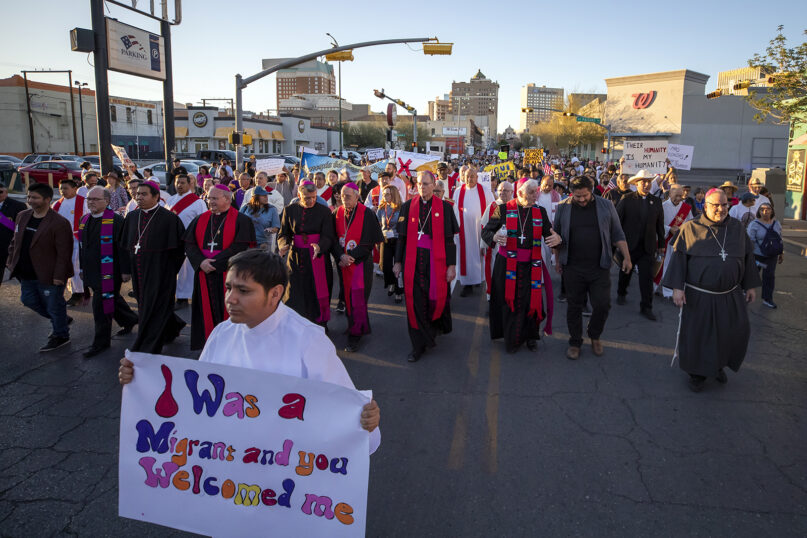
Catholic bishops lead a march in solidarity with migrants, March 24, 2025, in downtown El Paso, Texas, on the 45th anniversary of the assassination of Oscar Romero. (AP Photo/Andres Leighton)
The occasion was the 45th anniversary of the assassination of Óscar Romero, a Salvadoran archbishop and now a saint, who was shot a day after imploring Salvadoran soldiers in a homily to ignore the orders of the right-wing military government whose law, Romero preached, was “contrary to the law of God.” The bishops marched alongside hundreds in solidarity with migrants against the Trump deportation regime.
“It is that sense of community for which Jesus and Romero gave their lives that is under attack,” Seitz said. Just a few meters from the U.S.-Mexico border, he said, “We see that this attack on community and on human dignity is really a war on the poor.”
Romero’s courage was the theme of an April 11 commentary by Auxiliary Bishop Evelio Menjivar-Ayala in the Archdiocese of Washington’s magazine Catholic Standard, in which he said that immigrants are living Christ’s Passion and that the U.S. church needs “more Óscar Romeros today.”
Menjivar-Ayala, who emigrated from El Salvador at age 19, called out Catholics who have ignored the plight of migrants, pointing to “the lack of noticeable support by people they considered to be friends,” and asking “those of you who are silent or think this does not involve you” if they do “not see the suffering of your neighbors?”
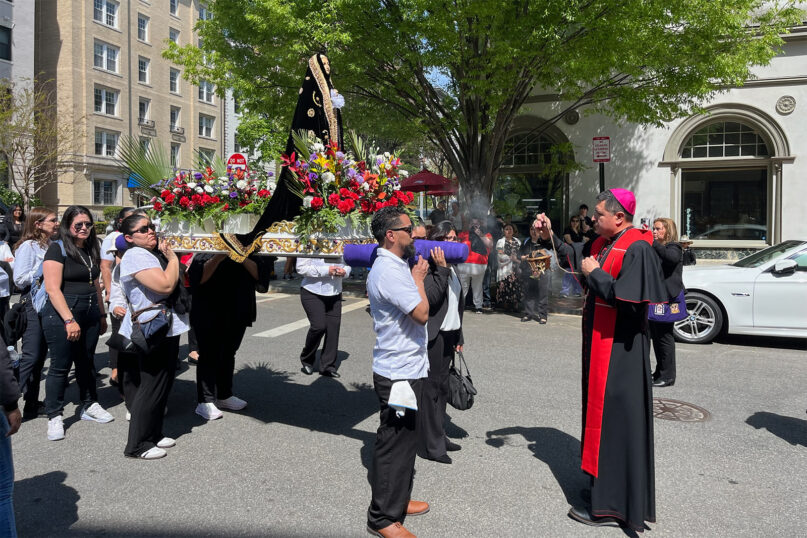
Washington Auxiliary Bishop Evelio Menjivar-Ayala, right, uses incense during a Good Friday procession, April 18, 2025, in Washington, D.C. (RNS photo/Aleja Hertzler-McCain)
Lee, who in addition to running Fordham’s Catholic studies center is author of “Revolutionary Saint: The Theological Legacy of Óscar Romero,” called Romero “this saint of the moment,” saying Catholic bishops have brought up Romero in private conversations recently.
The Salvadoran saint “lived in a country whose politics was completely polarized. He lived in a country in which the voices for human rights were vanishing, where journalism was precarious. The parallels between his situation and ours are so striking,” said Lee.
Lee noted that Romero wrote to then-President Jimmy Carter asking to stop the shipment of arms to El Salvador because they were being turned on Salvadorans. That violence has had a long shadow, Lee said. In 2022, El Salvador was ranked fifth in country of birth for immigrants to the U.S. “ Had the U.S. listened to Romero back then, we wouldn’t have the same immigration crisis we have today,” said Lee.
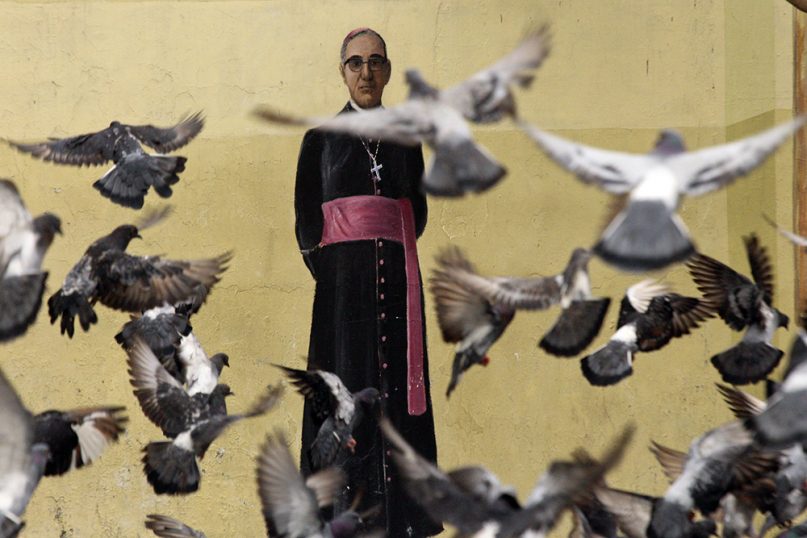
Pigeons fly in front of a mural of Archbishop Oscar Arnulfo Romero on a wall of the Metropolitan Cathedral in San Salvador, El Salvador, on Oct. 3, 2018. (AP Photo/Salvador Melendez)
Maggie Elmore, an associate professor of history at Baylor University who is writing a book about U.S. Catholic immigration history, said that the bishops have historically spoken strongly in favor of immigration. In 1924, when Congress accommodated nativist rumblings by creating quotas limiting immigration from certain regions, the U.S. bishops published “dozens of editorials” opposing the law and had people advocating on Capitol Hill “almost every day,” said Elmore.
The last major immigration reform measure to pass Congress, in 1986, was based in part on recommendations by the Rev. Theodore Hesburgh, the then-president of the University of Notre Dame. “ We’re not seeing that same level of advocacy right now,” said Elmore.
For decades, the USCCB has largely deployed its influence in the political sphere to oppose abortion, and since the overturning of Roe v. Wade in 2022, has invested money and time in pushing back ballot initiatives making abortion a right in state constitutions. While its efforts on immigration pale beside those, many individual bishops besides Seitz have made strong statements. Cardinal Robert McElroy, the new archbishop of Washington, said before Trump’s inauguration that “indiscriminate massive deportation across the country would be something that would be incompatible with Catholic doctrine.”
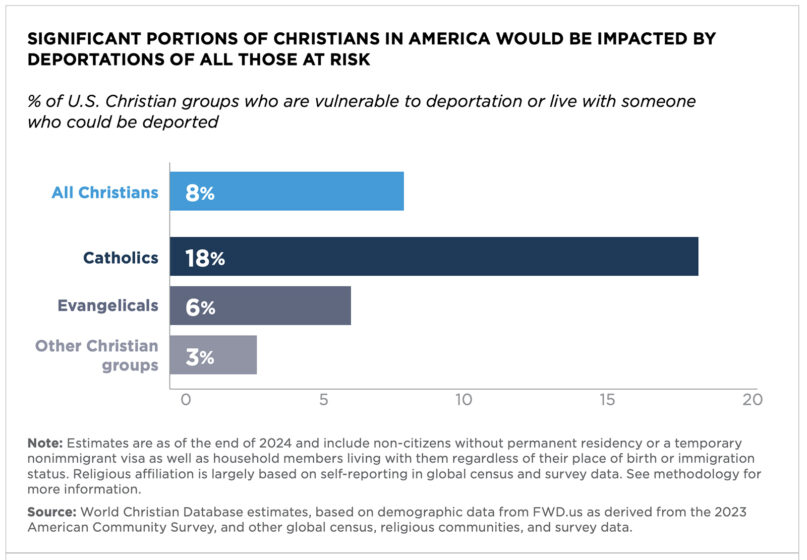
“Significant Portions of Christians in America Would Be Impacted by Deportations of All Those at Risk” (Courtesy graphic)
Besides suing to stop the cancellation of the conference’s refugee work, the bishops teamed up with evangelical Christian resettlement organizations to release a report estimating that 1 in 12 U.S. Christians and 1 in 5 Catholics could be impacted by mass deportations and successfully lobbied for the introduction of legislation reforming the religious worker visa program.
Earlier this year, the conference called for targeted and proportional immigration enforcement, humanitarian protections and due process, legal pathways to migrate, a path to citizenship for longtime residents and attention to family unity and the root causes of migration.
“ My hope is that when we do reach the point where there’s just such a universal level of frustration with the brokenness of the system,” said David Spicer, assistant director of policy, migration and refugee services for the conference, that inevitable immigration reform is done “in a way that actually furthers the common good.” He added that not all of the bishops’ dialogue on immigration is public.
Some of the loudest voices defending immigrants, however, come at the grassroots level. When the Kansas Catholic Conference supported a resolution urging the state’s governor to work with the administration on immigration enforcement and to consider sending the Kansas National Guard to the border, Sister Therese Bangert, of the Sisters of Charity of Leavenworth, opposed the resolution, offering the only in-person testimony at a hearing. (It passed the state Legislature but was not signed by the governor.)
More than two dozen congregations of Catholic sisters have pledged up to $300,000 to support a coalition of border ministries around San Diego providing legal and humanitarian aid to migrants stuck in Mexico.
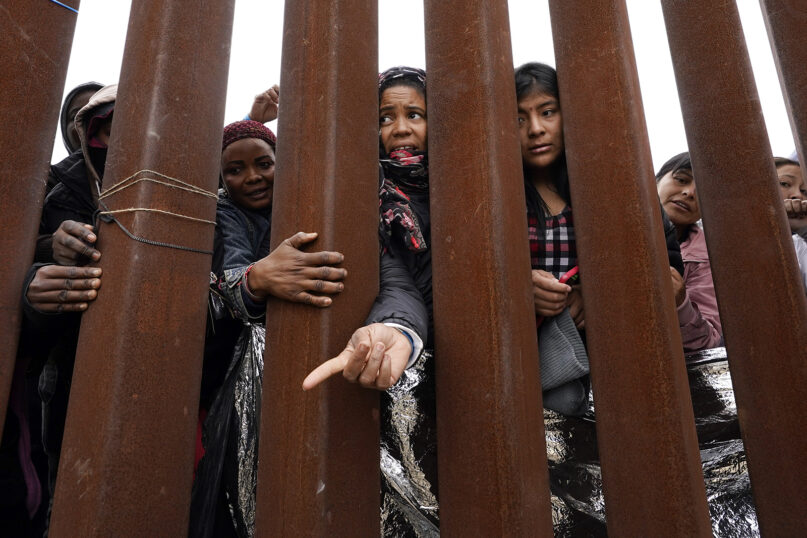
Migrants reach through a border wall for clothing handed out by volunteers, as they wait between two border walls to apply for asylum, May 12, 2023, in San Diego. (AP Photo/Gregory Bull)
San Diego is also home to the sole Catholic parish to join a lawsuit against a policy change allowing immigration enforcement to enter churches and other houses of worship. Our Lady of Guadalupe Parish, administered by Jesuits, filed the suit with an Oregon Latino organization, a Lutheran and a Presbyterian church and an interfaith group in San Francisco.
Local Catholics are also stepping up support for immigrant families. In Iowa, Escucha Mi Voz, a grassroots group that receives funding from the Catholic Campaign for Human Development, rallied more than 100 people to accompany the family of a Guatemalan asylum-seeker, Reina Marroquin, who fled the country with her children after receiving death threats, to her Immigration and Customs Enforcement check-in.
Deacon Kent Ferris, the Diocese of Davenport’s director of social action who prayed over Marroquin and her children as they entered the appointment, said,“ Making sure that people don’t have to go to these appointments alone is one way of cultivating the gospel.”
As detentions at these appointments increase during the Trump administration, Escucha Mi Voz leaders are working to turn out even bigger crowds, which they say provides protection for immigrants. (Marroquin and her children left the ICE appointment after only five minutes.)
For many Catholic communities, immigration is part of the fundamental fabric of the church. “ Over 60% of of undocumented immigrants have been living in the U.S. for over 10 years,” said Victor Carmona, associate professor of theology and religious studies at the University of San Diego. In that time, they fall in love and start families. “You have people joining parishes, becoming woven into the life of a community,” he said.
Carmona said he hoped Catholic leaders would provide leadership in envisioning “ an immigration system that is humane and compassionate” and lead the way in a national dialogue on the issue. “Our political system,” he said, appears to be attempting “to limit our vision through fear and instability, and the church’s response in this environment needs to be the opposite.”
